When you buy a product through our links below, we may earn money from our affiliate partners to help support the site. However, this does not affect our evaluation or recommendation of each product. See our list of partners & how we get paid here. You can also learn our process for reviewing tennis gear here.
Tennis balls today come from a number of tennis brands and in all sorts of varieties. Below, we’re going to help you find the right tennis ball for you by making it simple.
We’re going to show you the best tennis balls on the market today, and explain the differences between the different types of balls. We’ve researched and tested all the major tennis brands, and one of the 7 tennis balls below should be a great fit for you. We reviewed each ball on durability, performance, affordability, and more.
Whether you’re a beginner looking for value or an advanced player who needs a long-lasting tennis ball, you’ll find one below.
Before reading the reviews, you can see our list of the 7 best tennis balls here.
- Wilson US Open– Best Overall
- Penn Championship – Best Value
- Pro Penn Marathon
- Dunlop Grand Prix
- Wilson Championship Tennis Balls
- Penn Tour
- Wilson Triniti
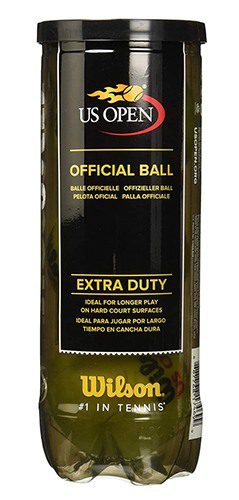
Best Tennis Ball by Category
Tennis balls have many features and options such as regular duty, extra duty, pressurized, and pressureless. Here are our top 3 picks overall.
Best Overall Tennis Ball

Best for long-lasting, consistent bounce & performance on hard courts
Best High-Altitude Tennis Ball

Best for play in high altitude locations like mountain towns
Reviews of the 7 Best Tennis Balls
Below, we have reviewed 7 of the top tennis balls from major brands and include specific features of each ball.
- Price | Scale from 1-3 dollar signs.
- Duty | Regular or Extra?
#1 – Wilson US Open Tennis Balls
The Wilson US Open comes in a 3-ball can and is made out of premium woven felt. The color is a basic tennis ball yellow that’s officially called “Optic Yellow.” It comes in regular duty and extra duty, making it great for hard court surfaces.
The best part about this tennis ball is its consistent performance and durability. After their first use, you can throw them in your tennis bag, and they will stay good longer than other balls. I’ve used them two or three weeks after opening the can for practice and they still bounced great.
Approved by the ITF and the USTA for matches in competition, these balls have a consistent bounce. They are also the official balls used in the U.S. Open.
Price | $$
Duty | Regular and Extra
Pros
- High quality felt material
- Great for longer play
- Consistent bounce & performance
- The can lasts weeks without losing pressure
- Great for outdoor hard courts
- High-altitude version available
- Available in regular & extra duty
Cons
- Not great for clay courts

#2 – Penn Championship Tennis Balls
The Penn Championship tennis ball is the “#1 best-selling ball in America” according to the can’s label. This is a great ball for one-time use and for players who aren’t too picky.
It’s not quite as high quality as the US Open ball above, but it is a better value. I usually buy these in bulk for most matches and practice.
This ball comes in two different types, extra duty for hard court surfaces and regular duty for soft court surfaces, which includes clay or grass. The ball is ITF approved and is also the official ball of the USTA leagues. With superior lasting durability due to the interlocking wool fibers that help to prevent loss of bounce, this is a ball that works for tennis players of any skill level.
After you open the tennis ball can, these Penn balls won’t last as long as the US Open balls above, or the ProPenn balls below.
Price | $
Duty | Regular and Extra
Pros
- Great value
- Quality interlocking wool fibers
- Available in regular & extra duty
Cons
- Small chance of uneven bounce
- Don’t last quite as long as other balls
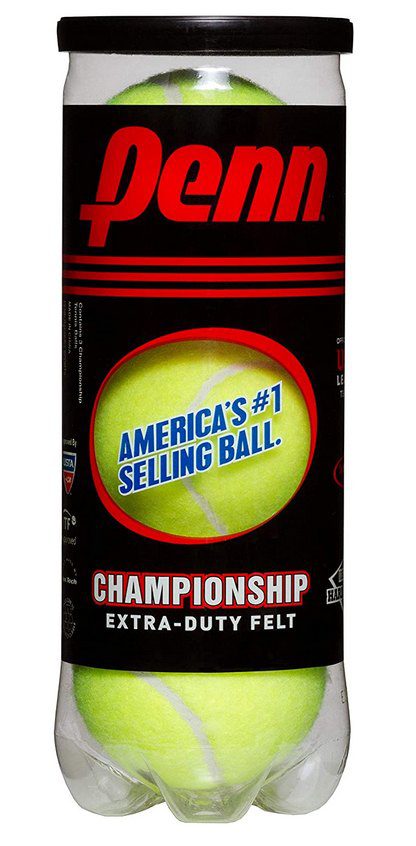
Stop paying full price for tennis gear! Get deals on shoes, racquets & more up to 70% off.
#3 – Pro Penn Marathon Tennis Balls
The Pro Penn Marathon is a slightly higher-quality tennis ball from Penn. They are meant for long-lasting tennis matches. These balls feature “Encore Technology” in the center for 22 percent longer play.
Similar to Wilson’s US Open balls, after opening the can, these balls can maintain their bounce and quality for weeks. The color of the ball is a specialized “Smart Optik” for exceptional visibility while playing. They make an extra duty felt version for hard courts, as well as a regular duty for clay or grass.
The USTA and ITF have approved this ball for league play. Beginners and low-level intermediate players may not need a tennis ball of this quality, but for advanced players, they are worth it if you need a ball that will last.
Price | $$$
Duty | Regular and Extra
Pros
- Consistent, long-lasting performance
- Improved visibility
- Keeps pressure for weeks
- Available in regular & extra duty
Cons
- Slightly heavier than a regular Penn Championship ball
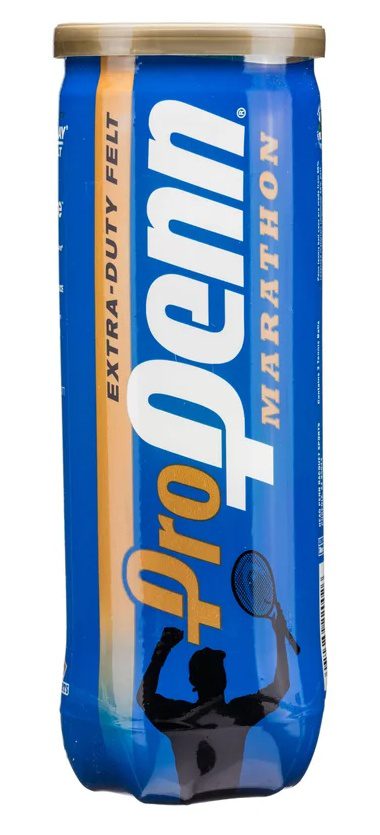
#4 – Dunlop Grand Prix Tennis Balls
The Dunlop Grand Prix tennis ball is another premium option. This type of ball has a special mix of 14 different materials that make up the rubber core. The outside is a fine woven felt that can withstand wear and tear.
The yellow color of the ball is meant to be brighter than the average tennis ball for better visibility. Dunlop calls it their “MaxGlo” felt. They are made in extra duty for hard courts and regular duty for clay or grass. These balls are also approved for USTA and ITF matches and league play.
I like these tennis balls a lot, but they are not quite as popular as Penn and Wilson. I’ve had league matches where other players complain about Dunlop, but I haven’t found any issues.
Price | $$
Duty | Regular and Extra
Pros
- Bright in color & easier to see
- Long-lasting
- Doesn’t go flat quickly
- Available in regular & extra duty
Cons
- Not as popular as Penn or Wilson
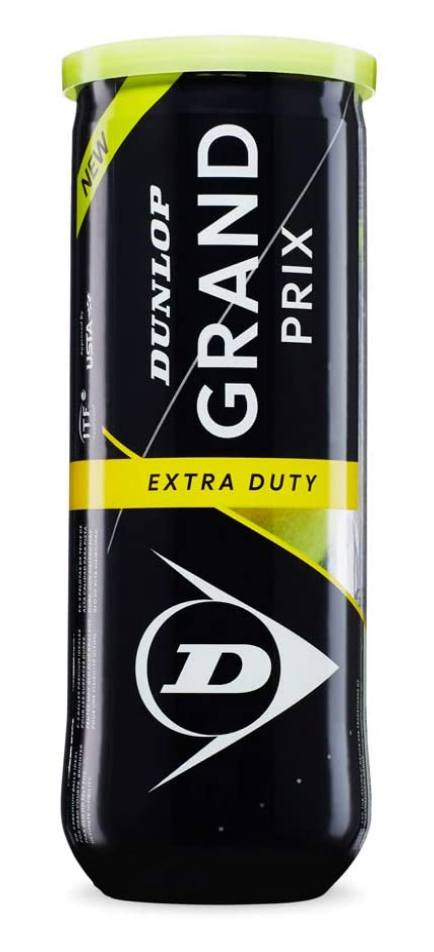
#5 – Wilson Championship Tennis Balls
The Wilson Championship tennis balls come in regular and extra duty making them great for any court surface.
These are great tennis balls for practice or league play. Wilson has created them with a special fiber called Duraweave, which has interlocking fiber technology. The goal of this fiber is to last longer and not wear down as much.
These balls are a great value for their durability during long matches. However, they will go flat in your tennis bag faster than the US Open tennis balls.
Price | $
Duty | Regular and Extra
Pros
- High-performance & consistent bounce
- High-quality felt
- Maintains consistency throughout a match
- Available in regular & extra duty
Cons
- Won’t last more than several days
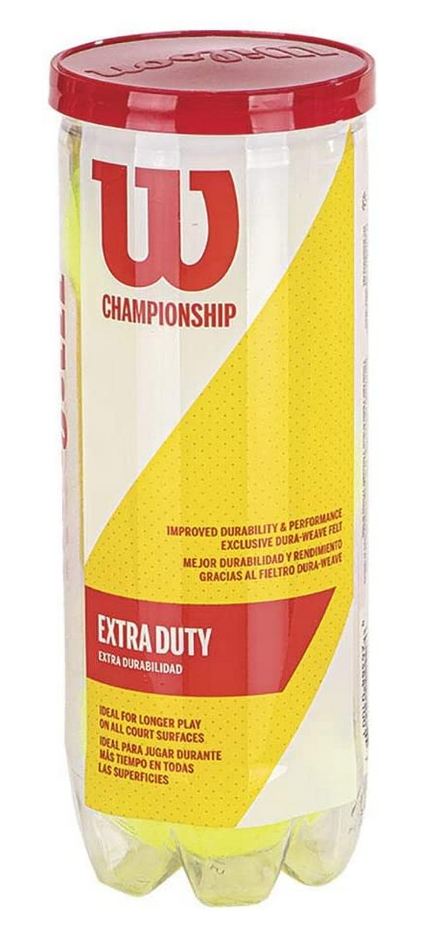
#6 – Penn Tour Tennis Balls
The Penn Tour tennis ball is the official ball of some of the biggest professional tennis tournaments in the US, making it one of the higher quality balls on our list.
It has tournament grade “LongPlay” felt and comes in both extra and regular duty. Penn also uses their Smart Optik technology to make the ball more visible. The core is made of technical grade rubber that has a nice bounce rate. This ball is USTA and ITF approved as well.
Price | $
Duty | Regular and Extra
Pros
- Smart Optik in color for better visibility
- Long-lasting ball with great bounce
- Retains their shape without going flat
- Maintains quality for days or weeks
- Available in regular & extra duty
Cons
- Lighter in weight than some other balls
- Feels slightly bigger than other balls
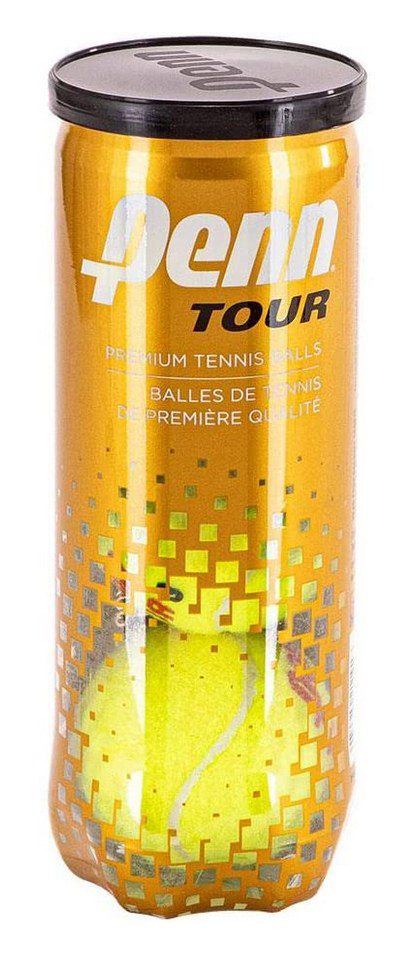
#7 – Wilson Triniti Tennis Balls
The Wilson Triniti is a new line of tennis balls from the popular brand. It’s their version of a green or eco-friendly tennis ball. The can is made of recyclable paper.
The ball itself is considered an “all performance” ball that can be used on any court surface. Wilson has used some new technologies to make this work, including their Engage Core and STR felt. These technologies help the ball last longer and feel better on contact. It’s also a USTA and ITF approved tennis ball.
Price | $$$
Duty | N/A
Pros
- Great for longer play
- Good for hard, grass, & clay courts
- High quality felt
- Maintains bounce longer than most balls
- Fully recyclable can
- Repels water well
Cons
- Slightly more expensive than other tennis balls
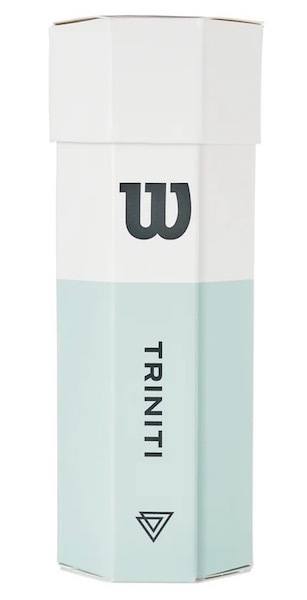
Different Types of Tennis Balls
There are many different types of tennis balls for various court surfaces, skill levels, and styles of play. Picking out the right kind of ball can improve your game. Here are some common categories of tennis balls.
Extra Duty Tennis Balls are for Hard Courts
These tennis balls are meant for hard court surfaces. The fiber is thicker on extra duty balls so that they hold up to the wear and tear of an unforgiving surface.

Regular Duty Balls are for Clay or Grass
Often called soft court balls, regular duty balls are meant for clay or grass playing surfaces. The fiber coating on the balls is thinner so it doesn’t pick up the clay of the court. Clay tends to absorb the impact of the ball more so this type of ball compensates for this fact.
Regular duty balls can be used on hard courts, but they won’t last quite as long.
All Court Tennis Balls
A general ball that is great for play on any surface whether it’s hard, grass, or clay. If you are going to be playing on different surfaces, this is a general ball that you can take to any court.
High Altitude Tennis Balls
This style of ball is made for play above 3500 feet sea level. So if you are going to be playing in a mountain town, you may want to pick up a can of high altitude balls. The problem with regular balls in high altitudes is that they tend to bounce too high and fast.
High altitude balls solve this issue and are meant to be used on any court surface. The reason they work better in high altitudes is due to a depressurized core. Many manufacturers make a high-altitude version for each of their tennis balls.
Training Balls for Beginners or Kids
This type of ball is designed to make tennis a little bit slower by having less bounce than a standard ball. The extra time to react and hit the ball will be less frustrating for someone who is new to the game. They come in foam material, or different colored sizes that are low compression.
Non-Pressurized or Pressureless Tennis Balls
Sometimes this style of ball is called pressureless. They come in packs or cans that aren’t pressurized. The goal with this style of ball is longevity. Casual or recreational players may prefer this kind of ball since you don’t have to replace them as often. They don’t go flat like pressurized balls, but also don’t have the same style of bounce, spin, and speed.
Pressureless balls are often used in tennis ball machines since they last longer.
The Most Popular Tennis Ball Brands
The most popular tennis ball brands are Wilson and Penn. These are the brands you are most likely to find in your local sporting goods or big box store. Of course, there are other companies in the tennis gear world that make quality tennis balls as well. Some of those brands include:
- Dunlop
- Babolat
- Prince
- Slazenger
- Gamma
You can easily order any of these balls online in various outlets, but it may be harder to find those specialty brands locally if you don’t live in a big city.
It’s natural to develop an affinity for a certain brand of tennis ball. So if you have a Wilson tennis racket, you might generally favor Wilson tennis balls simply because of your brand loyalty.
What Is the Difference Between Regular Duty & Extra Duty Tennis Balls?
Regular duty tennis balls are meant for soft court surfaces, like grass or clay. Extra duty balls are meant for hard court surfaces.
The felt covering on regular duty balls is a little bit thinner to help absorb less of the clay. They have minimal fluff to deal with. Extra duty balls have a thicker coating of fiber in order to have the proper amount of bounce. They can also withstand the wear and tear of the harder surface better than regular duty balls.
What Is the Difference Between Pressurized & Pressureless Tennis Balls?
The difference between pressurized and pressureless tennis balls is that you don’t have to replace pressureless balls as often. The felt surface of the ball will wear out eventually, but they don’t go flat like pressurized tennis balls.
Pressurized tennis balls will lose their bounce after a certain amount of playing time, or if you just let them sit in your tennis bag for long enough, so you have to buy new balls more.

Pressurized tennis balls are much more common, and recommended for most situations.
People like pressureless tennis balls for recreational play or practice. Pressureless balls are the best tennis balls for a ball machine since they last longer. Most high level or professional players do not use pressureless balls. They are mostly for amateur play. You can usually buy pressureless tennis balls in high quantities for practicing.
What Do the Numbers on Tennis Balls Mean?
The numbers on the tennis balls don’t mean anything at all. They are just the easiest method of identification.
The purpose of the numbers is that when you play next to other courts, you don’t get your balls mixed up. That way at the end of play you can take all of your balls home with you.
Or if your ball goes on another player’s court during a match, at a break, you can ask them for the Penn 3 to get your ball back.
Training Tennis Balls for Kids: Red, Orange, Green and Yellow Ball
One of the best tennis training aids for kids who are just learning how to play are special kid or junior-sized balls. Sometimes they come in larger sizes made of foam so they can see them easier to hit and are lighter in weight. The larger ball is more likely to hit the surface area of their racket.
They also come in different colors.
- Red ball is low compression for kids 8 and under.
- Orange ball is also low compression for ages 9-10, and is a little smaller than red.
- Yellow ball with a green dot is mild compression for ages 11 and up, and is still a little smaller than red or green.
- Yellow ball is a standard tennis ball.
Stop paying full price for tennis gear! Get deals on shoes, racquets & more up to 70% off.
How to Choose the Best Tennis Ball for You
Similar to when you choose a tennis racquet, there are many factors that determine what type of ball you want to use. Your skill level, age, and court surface you’ll be playing on will help you figure out what type of ball you want.
What is Your Skill Level?
If you are a beginner or child, then you may want to start out with pressureless or trainer tennis balls. They bounce and move slower than extra duty or regular balls so they are the best training tennis balls.
However, for most physically strong adults and teens, you should use normal yellow tennis balls, even if you haven’t played before.
Beginners should purchase a cheaper ball, however. The Wilson Championship and Penn Championship balls above are perfect.
Advanced players will want something with more durability and consistency since they hit the ball harder. The best options are the Wilson US Open balls, Pro Penn Marathon, and Penn Tour tennis balls. The Championship balls above will work as well, but they won’t last more than one or two matches.
What Court Surface Are You Playing On?
Picking out balls for your court surface is also important.
- If you are playing on a hard court, go with extra duty.
- For grass or clay, you’re going to need regular duty.
- For playing high above sea level, use high-altitude balls.
What is Your Budget?
If you are budget conscious, then you may want to choose a lower-cost option above like the Wilson or Penn Championship balls. Keep in mind though, that these won’t last as long as some of the higher quality tennis balls on our list.
Conclusion: Our Pick for the Top Tennis Balls
Our favorite tennis ball is the Wilson US Open tennis ball. This ball has high-quality materials, a consistent bounce, and best of all, it will last weeks in your tennis bag without losing much quality.
If you play only on weekends or many days apart, you’ll either have to purchase a new can every time you play or buy a high-quality ball like the Wilson US Open. The extra duty is meant for hard court surfaces, but beginners through pros will enjoy playing with this ball. Even though these are technically extra duty, you can truly play this ball on any court type.
Wilson and the US Open are two iconic tennis entities that combine to make one of the best tennis balls in the world.
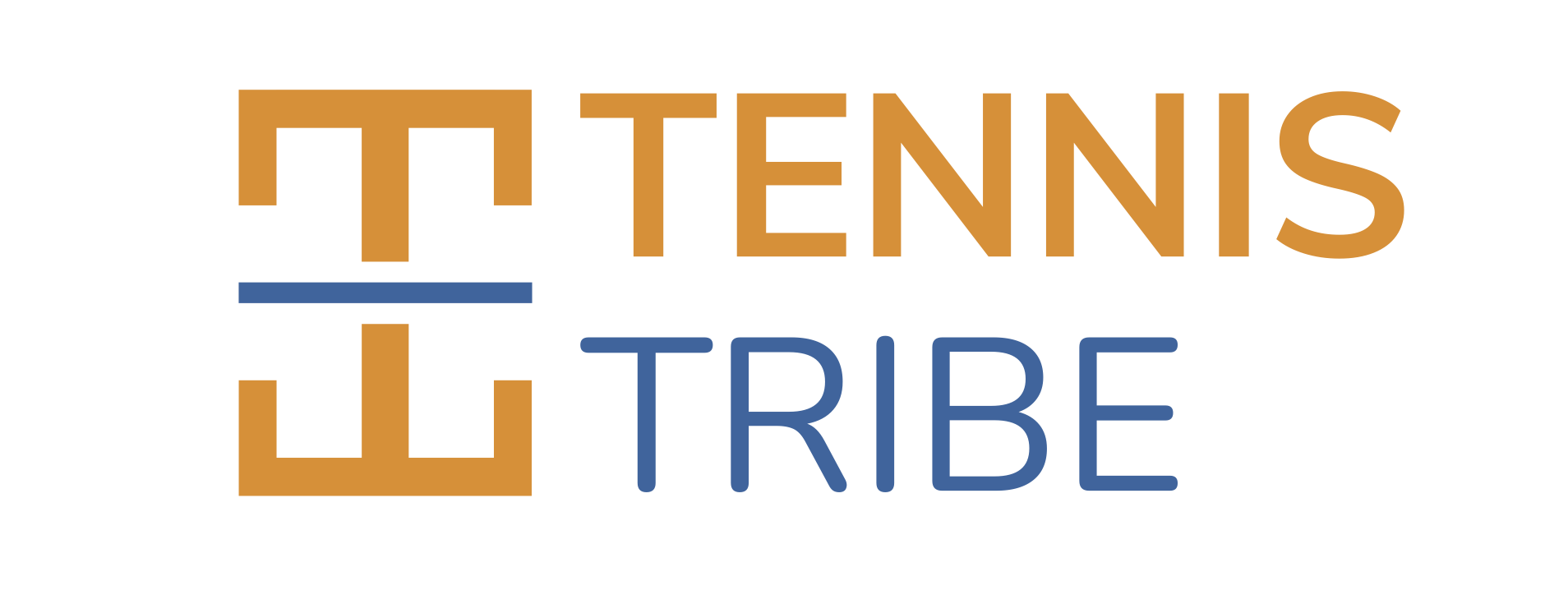

I don’t see the TITAN listed and reviewed anywhere. Why is that? It seems such a solid machine.
https://titanballmachines.com/collections/titan-tennis-machines/products/titan-tennis-ball-machine
Hi Larry, I haven’t used that ball machine. Thanks for the suggestion!
A few of us guys in our tennis group love the game so much we play year around. The problem is that when the temperature gets in the 40s, the balls don’t bounce worth a darn. We have found this to be the case with both the Wilson US Open and the Penn Championship balls. Are there any balls designed for cold weather play?
Hi Daniel, good question. I imagine heavy duty balls are better. I’ve also heard some people say the Wilson Triniti balls do better in cold weather. However, I find them a bit heavy and less consistent. Still, it may be worth buying a few cans to see what you think.
Best of luck!
“Great blog! I love how detailed and informative this post is. The breakdown of different tennis balls and their uses is super helpful, especially for someone like me who plays on both hard and clay courts. I also appreciate the recommendations for beginners versus advanced players—it makes choosing the right ball much easier. Definitely going to try the Wilson US Open balls based on your review. Thanks for sharing!”